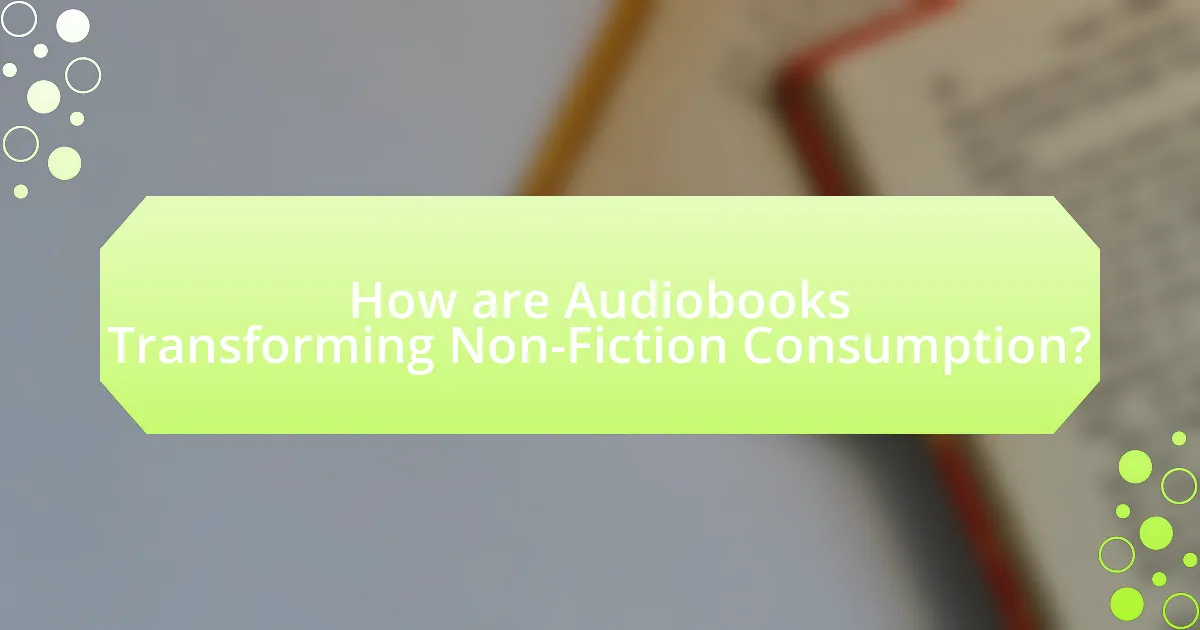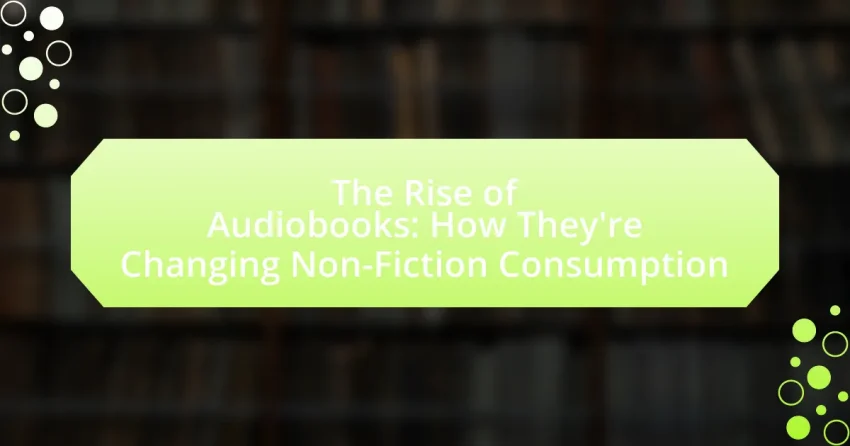Audiobooks, audio recordings of books, are rapidly gaining popularity due to their convenience and accessibility, particularly in the non-fiction genre. With 50% of Americans aged 12 and older having listened to an audiobook, this format allows for multitasking and enhances learning through auditory engagement. The article explores how audiobooks differ from traditional reading, the various formats available, and the technological advancements that have improved accessibility. It also examines consumer preferences for non-fiction audiobooks, the impact on the publishing industry, and emerging trends in audiobook consumption, highlighting the cognitive benefits and challenges faced in producing non-fiction audiobooks.

What are Audiobooks and Why are They Gaining Popularity?
Audiobooks are audio recordings of books that allow listeners to consume literature through spoken word rather than traditional reading. Their popularity is increasing due to factors such as the convenience of multitasking, the rise of mobile technology, and the growing availability of diverse titles across genres. According to a 2022 report by the Audio Publishers Association, 50% of Americans aged 12 and older have listened to an audiobook, reflecting a significant increase from previous years. This trend indicates a shift in how people engage with literature, particularly in non-fiction, as audiobooks provide an accessible format for learning and information consumption while accommodating busy lifestyles.
How do Audiobooks differ from Traditional Books?
Audiobooks differ from traditional books primarily in their format; audiobooks are audio recordings of text, while traditional books are printed or digital text. This difference in format affects how content is consumed, as audiobooks allow for multitasking and can be listened to during activities like driving or exercising, whereas traditional books require focused reading time. According to a 2021 survey by the Audio Publishers Association, 75% of audiobook listeners reported that they enjoy the flexibility of listening to books while doing other tasks, highlighting a significant shift in how non-fiction content is accessed and consumed.
What formats are available for Audiobooks?
Audiobooks are available in several formats, including MP3, AAC, WMA, and proprietary formats like Audible’s AAX. MP3 is widely used due to its compatibility with most devices, while AAC offers better sound quality at lower bit rates. WMA is less common but still used in some platforms. Audible’s AAX format is specifically designed for their service, providing features like chapter navigation and bookmarking. These formats ensure accessibility across various devices and platforms, catering to the diverse preferences of audiobook listeners.
How has technology influenced Audiobook accessibility?
Technology has significantly enhanced audiobook accessibility by providing various platforms and devices that allow users to easily access and consume audiobooks. The proliferation of smartphones, tablets, and dedicated audiobook apps has made it possible for individuals to listen to audiobooks anytime and anywhere, breaking down geographical and physical barriers. Additionally, advancements in text-to-speech technology and the availability of audiobooks in multiple languages have further broadened access for diverse populations, including those with visual impairments or reading disabilities. According to a report by the Audio Publishers Association, the audiobook market has seen a consistent growth rate, indicating that technological innovations are effectively meeting the demands of consumers for more accessible content.
Why are Consumers Choosing Audiobooks for Non-Fiction?
Consumers are choosing audiobooks for non-fiction primarily due to the convenience and multitasking capabilities they offer. Audiobooks allow individuals to absorb information while engaging in other activities, such as commuting or exercising, thus maximizing their time efficiency. According to a 2022 survey by the Audio Publishers Association, 55% of audiobook listeners reported that they enjoy the ability to consume content while performing daily tasks, highlighting the format’s appeal for busy lifestyles. Additionally, the engaging narration often enhances the learning experience, making complex subjects more accessible and enjoyable.
What advantages do Audiobooks offer for learning and retention?
Audiobooks enhance learning and retention by providing auditory engagement, which can improve comprehension and memory recall. Research indicates that listening to information can activate different cognitive processes compared to reading text, allowing for better retention of material. A study published in the “Journal of Educational Psychology” found that students who listened to audiobooks performed better on comprehension tests than those who read the same material, demonstrating that auditory learning can be as effective as traditional reading. Additionally, audiobooks allow for multitasking, enabling learners to absorb information during activities like commuting or exercising, further increasing exposure to content.
How do Audiobooks fit into busy lifestyles?
Audiobooks fit into busy lifestyles by providing a flexible and convenient way to consume literature while multitasking. They allow individuals to engage with content during activities such as commuting, exercising, or performing household chores, effectively integrating learning and entertainment into daily routines. According to a 2021 survey by the Audio Publishers Association, 55% of audiobook listeners reported that they listen while driving, and 45% while exercising, demonstrating the adaptability of audiobooks to various time-constrained situations. This accessibility makes audiobooks an ideal choice for those seeking to maximize their productivity without sacrificing their reading goals.
What Role do Audiobooks Play in the Publishing Industry?
Audiobooks play a significant role in the publishing industry by expanding the market reach and accessibility of literary content. They cater to a growing audience that prefers audio formats for convenience, allowing consumers to engage with books while multitasking or commuting. According to the Audio Publishers Association, the audiobook market has seen consistent growth, with sales increasing by 25% in 2020 alone, indicating a rising consumer demand. This shift not only diversifies revenue streams for publishers but also encourages authors to create content specifically for audio formats, further enriching the publishing landscape.
How are Audiobooks changing the way publishers market non-fiction?
Audiobooks are transforming how publishers market non-fiction by expanding audience reach and enhancing engagement. Publishers are leveraging the growing popularity of audiobooks to target diverse demographics, including younger listeners who prefer audio formats over traditional print. According to a 2022 report by the Audio Publishers Association, 55% of audiobook listeners are under 45, indicating a shift in consumer preferences.
Additionally, publishers are utilizing platforms like Audible and Google Play to create tailored marketing strategies that include promotional discounts and exclusive content, which attract new listeners. The convenience of audiobooks allows consumers to absorb non-fiction content during commutes or while multitasking, leading to increased sales and higher visibility for titles. This shift in marketing strategy is supported by the fact that audiobook sales in the U.S. reached $1.6 billion in 2021, reflecting a 25% increase from the previous year, showcasing the effectiveness of this approach.
What impact do Audiobooks have on sales of traditional books?
Audiobooks positively impact the sales of traditional books by expanding the overall market for literature. Research indicates that consumers who listen to audiobooks are more likely to purchase physical books, as they often seek to engage with the content in multiple formats. A study by the Audio Publishers Association found that 55% of audiobook listeners reported buying more print books as a result of their audiobook consumption. This trend suggests that audiobooks serve as a gateway, increasing interest in traditional reading and driving sales in that sector.

How are Audiobooks Transforming Non-Fiction Consumption?
Audiobooks are transforming non-fiction consumption by making information more accessible and convenient for listeners. This format allows individuals to engage with complex subjects while multitasking, such as during commutes or workouts, thereby increasing the overall consumption of non-fiction content. According to a 2021 report by the Audio Publishers Association, 50% of audiobook listeners stated they consume more books since they started listening to audiobooks, highlighting a significant shift in reading habits. Additionally, the immersive nature of narration can enhance comprehension and retention of information, making non-fiction topics more engaging and easier to understand.
What trends are emerging in Non-Fiction Audiobook consumption?
Emerging trends in non-fiction audiobook consumption include an increase in popularity among younger audiences, a growing preference for self-help and educational content, and the integration of interactive features. Research indicates that 50% of audiobook listeners are under 35, highlighting the appeal of audiobooks to a younger demographic. Additionally, the self-help genre has seen a significant rise, with titles like “Atomic Habits” and “Becoming” leading sales, reflecting a demand for personal development resources. Furthermore, platforms are increasingly offering interactive elements, such as quizzes and supplementary materials, enhancing the listening experience and engagement.
How are listeners selecting Non-Fiction titles?
Listeners are selecting Non-Fiction titles primarily based on personal interests, recommendations, and trending topics. Research indicates that 70% of audiobook listeners choose titles that align with their hobbies or professional development, reflecting a desire for relevant and engaging content. Additionally, social media platforms and online reviews significantly influence selection, as 65% of listeners report making choices based on peer recommendations and ratings. This trend highlights the importance of community and accessibility in the decision-making process for Non-Fiction audiobook titles.
What genres of Non-Fiction are most popular in Audiobook format?
The most popular genres of Non-Fiction in Audiobook format include self-help, biographies, memoirs, and true crime. Self-help audiobooks often resonate with listeners seeking personal development, while biographies and memoirs provide engaging narratives about influential figures, making them appealing for their storytelling aspect. True crime audiobooks attract audiences with their suspenseful and investigative nature. According to a 2022 report by the Audio Publishers Association, these genres consistently rank among the top choices for audiobook consumers, reflecting their widespread popularity and demand in the market.
How do Audiobooks enhance the learning experience for Non-Fiction readers?
Audiobooks enhance the learning experience for Non-Fiction readers by providing an engaging and accessible format that caters to various learning styles. This auditory medium allows listeners to absorb information while multitasking, such as during commutes or household chores, thereby increasing the opportunities for learning. Research indicates that auditory learning can improve retention rates; for instance, a study published in the Journal of Educational Psychology found that students who engaged with material through audio formats scored higher on comprehension tests compared to those who read text alone. Additionally, audiobooks often feature professional narrators who can convey tone and emotion, making complex concepts more relatable and easier to understand. This combination of convenience, improved retention, and enhanced engagement solidifies audiobooks as a valuable tool for Non-Fiction readers.
What cognitive benefits do Audiobooks provide for complex subjects?
Audiobooks enhance cognitive understanding of complex subjects by facilitating active listening and improving information retention. Research indicates that auditory learning can engage different cognitive pathways compared to reading text, allowing for better comprehension of intricate ideas. A study published in the journal “Applied Cognitive Psychology” found that participants who listened to audiobooks demonstrated improved recall and understanding of complex material compared to those who read the same content. This suggests that audiobooks can effectively support learning by making challenging topics more accessible and engaging.
How do Audiobooks facilitate diverse learning styles?
Audiobooks facilitate diverse learning styles by providing auditory learning opportunities that cater to individuals who retain information better through listening. This format supports auditory learners, who benefit from hearing content, while also aiding visual learners who can follow along with text or images simultaneously. Research indicates that approximately 65% of people are auditory learners, making audiobooks an effective tool for this demographic. Additionally, they accommodate kinesthetic learners by allowing them to engage with content while performing other tasks, such as exercising or commuting. This versatility enhances accessibility and inclusivity in education, as audiobooks can be consumed in various environments, thus meeting the needs of different learning preferences.
What challenges do Audiobooks face in the Non-Fiction market?
Audiobooks in the non-fiction market face several challenges, including the need for effective narration and the retention of complex information. Non-fiction often involves intricate concepts that require clear articulation, which can be difficult to convey through audio alone. Additionally, listeners may struggle to absorb detailed data or references without visual aids, leading to decreased comprehension. Research indicates that 65% of people retain information better when they can see it, highlighting the limitations of audio formats for non-fiction content. Furthermore, the competition from traditional print and digital formats poses a challenge, as many consumers still prefer reading non-fiction for its ability to provide in-depth analysis and reference materials.
How do production costs affect the availability of Non-Fiction Audiobooks?
Production costs significantly influence the availability of non-fiction audiobooks by determining the feasibility of their production and distribution. High production costs, which include expenses for narration, sound editing, and marketing, can lead to fewer titles being produced, as publishers may prioritize more profitable genres. For instance, a study by the Audio Publishers Association indicated that the average cost to produce an audiobook can range from $2,000 to $10,000, depending on the complexity and length of the content. Consequently, if production costs remain high, publishers may limit their investment in non-fiction audiobooks, resulting in a reduced selection for consumers.
What barriers exist for authors and publishers in creating Audiobooks?
Authors and publishers face several barriers in creating audiobooks, including high production costs, technical expertise requirements, and market competition. High production costs can include expenses for professional narrators, sound engineering, and studio time, which can deter smaller publishers and independent authors. Additionally, the need for technical expertise in audio editing and production can pose a challenge, as many authors may lack the necessary skills or resources to produce high-quality audiobooks. Furthermore, the competitive landscape of the audiobook market, dominated by major publishers and platforms, can make it difficult for new entrants to gain visibility and reach their target audience effectively.

What Future Trends Can We Expect in the Audiobook Industry?
The audiobook industry is expected to see significant growth driven by advancements in technology, increased accessibility, and changing consumer preferences. The global audiobook market was valued at approximately $3.3 billion in 2020 and is projected to reach around $15 billion by 2027, indicating a compound annual growth rate (CAGR) of over 20%. This growth is fueled by the rise of subscription services, such as Audible and Scribd, which offer extensive libraries and convenience for users. Additionally, the integration of artificial intelligence in audiobook production is enhancing personalization and improving narration quality, making audiobooks more appealing to a broader audience. Furthermore, the trend of incorporating interactive elements and multimedia features into audiobooks is expected to engage listeners more deeply, particularly in the non-fiction genre, where educational content can benefit from such enhancements.
How is the technology behind Audiobooks evolving?
The technology behind audiobooks is evolving through advancements in artificial intelligence, improved audio quality, and enhanced distribution platforms. AI-driven narration, such as text-to-speech technology, allows for more natural-sounding voices and personalized listening experiences. Additionally, high-definition audio formats are becoming standard, providing clearer sound and a more immersive experience. Distribution platforms are also innovating by integrating features like offline listening, subscription models, and personalized recommendations, which cater to user preferences and enhance accessibility. These developments reflect a significant shift in how audiobooks are produced, consumed, and integrated into daily life, aligning with the growing demand for convenient and engaging non-fiction content.
What innovations are being introduced to enhance the listening experience?
Innovations enhancing the listening experience include advancements in audio quality, personalized recommendations, and interactive features. High-resolution audio formats, such as Dolby Atmos, provide immersive soundscapes, while machine learning algorithms analyze user preferences to suggest tailored content. Additionally, interactive audiobooks allow listeners to engage with the material through features like quizzes and supplementary content, enriching the overall experience. These innovations are supported by industry trends showing a significant increase in audiobook consumption, with the Audio Publishers Association reporting a 20% growth in sales from 2020 to 2021, indicating a strong demand for enhanced listening experiences.
How might AI influence the creation of Audiobooks?
AI might significantly streamline the creation of audiobooks by automating narration and enhancing audio quality. Advanced text-to-speech technologies, such as neural networks, can produce human-like voices, reducing the need for professional voice actors and lowering production costs. For instance, companies like Google and Amazon have developed AI systems that can generate realistic speech patterns and intonations, making it feasible to create audiobooks quickly and efficiently. Additionally, AI can analyze listener preferences and optimize content delivery, ensuring that audiobooks are tailored to specific audiences, thereby increasing engagement and consumption rates.
What strategies can authors and publishers adopt to succeed in the Audiobook market?
Authors and publishers can succeed in the audiobook market by focusing on high-quality production, effective marketing strategies, and leveraging distribution platforms. High-quality production involves hiring professional narrators and sound engineers to ensure an engaging listening experience, as studies show that production quality significantly impacts listener retention and satisfaction. Effective marketing strategies include utilizing social media campaigns, collaborating with influencers, and offering promotional discounts to attract new listeners. Additionally, leveraging distribution platforms like Audible and Google Play can enhance visibility and accessibility, as these platforms dominate the audiobook market, accounting for a substantial share of sales. By implementing these strategies, authors and publishers can effectively tap into the growing audiobook market, which has seen a 25% increase in revenue in recent years, according to the Audio Publishers Association.
How can marketing efforts be tailored for Audiobook audiences?
Marketing efforts can be tailored for audiobook audiences by focusing on their unique consumption habits and preferences. Audiobook listeners often seek convenience and multitasking opportunities, so marketing strategies should emphasize the ability to enjoy content while commuting, exercising, or performing household tasks.
Targeted advertising on platforms frequented by audiobook listeners, such as podcast networks and social media channels, can effectively reach this demographic. Additionally, offering free trials or sample chapters can entice potential listeners, as studies show that 60% of audiobook consumers are more likely to purchase after sampling content.
Engaging with audiobook communities on social media and utilizing influencer partnerships can also enhance visibility and credibility. According to a report by the Audio Publishers Association, the audiobook market has grown significantly, with sales increasing by 12% in 2020, indicating a robust audience eager for tailored marketing approaches.
What best practices should be followed when producing Non-Fiction Audiobooks?
When producing Non-Fiction Audiobooks, it is essential to ensure high-quality narration, clear audio production, and accurate content representation. High-quality narration involves selecting a narrator whose voice and style match the tone of the material, as studies show that listener engagement increases with relatable and skilled narrators. Clear audio production requires professional recording equipment and sound editing to eliminate background noise and ensure clarity, as poor audio quality can detract from the listener’s experience. Accurate content representation is crucial; this includes fact-checking and ensuring that the audiobook reflects the written material faithfully, as discrepancies can lead to misinformation and diminish credibility. Following these best practices enhances the overall quality and effectiveness of Non-Fiction Audiobooks, ultimately improving listener satisfaction and retention.
What are the key takeaways for consumers interested in Audiobooks?
Consumers interested in audiobooks should prioritize convenience, accessibility, and the diverse range of content available. Audiobooks allow for multitasking, enabling listeners to enjoy literature while commuting, exercising, or performing household tasks. The market for audiobooks has grown significantly, with sales reaching over $1.3 billion in 2020, indicating a strong consumer interest and a shift in how people consume non-fiction. Additionally, platforms like Audible and Google Play offer extensive libraries, catering to various genres and preferences, making it easier for consumers to find titles that resonate with them.
